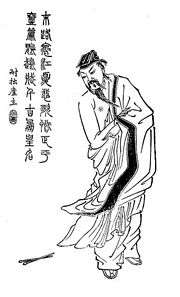Mi Heng
| Mi Heng | |
|---|---|
|
A Qing dynasty portrait of Mi Heng | |
| Scholar | |
| Born | 173 |
| Died | 198 (aged 25) |
| Names | |
| Courtesy name | Zhengping (Chinese: 正平) |
| Mi Heng | |||||||||||||||||||||||||||
| Traditional Chinese | 禰衡 | ||||||||||||||||||||||||||
|---|---|---|---|---|---|---|---|---|---|---|---|---|---|---|---|---|---|---|---|---|---|---|---|---|---|---|---|
| Simplified Chinese | 祢衡 | ||||||||||||||||||||||||||
| |||||||||||||||||||||||||||
| Alternative Chinese name | |||||||||||||||||||||||||||
| Chinese | 正平 | ||||||||||||||||||||||||||
| Literal meaning | (courtesy name) | ||||||||||||||||||||||||||
| |||||||||||||||||||||||||||
Mi Heng[lower-alpha 1] (Chinese: 禰衡; c. AD 173 – 198), courtesy name Zhengping, was an ancient Chinese writer and musician who lived during the later Han dynasty. Mi is best known for his fu rhapsody "Fu on the Parrot", which is his only work that has survived to modern times.[1]
Life
Mi Heng was born around AD 173 in Ban County (modern Shanghe, Shandong Province).[2] In the early 190s, Mi, like many other Chinese, fled northern China to escape the chaos of the collapsing Han dynasty. He settled in the Jingzhou area (modern Hubei and Hunan) and joined the staff of its governor-general, Liu Biao. Around 196, Mi moved north to join the court that Cao Cao had established at Xu (modern Xuchang, Henan Province).[2] Mi was friendly with the prominent scholar Kong Rong, who wrote a memorial recommending Mi for imperial service and submitted it to Emperor Xian of Han, who was then mostly a puppet ruler for Cao Cao.[2] Mi returned to Liu Biao's court in 197, where he stayed until his death a year or two later.
Although Mi was known as a gifted poet and talented writer, he was prone to erratic behavior, offensive jokes, and an arrogant attitude that made him difficult to socialize with, and even caused some to question his sanity.[3]
Upon arriving in Xu around 196, Kong Rong spoke highly of Mi to Cao Cao, who summoned him to come see him.[2] Mi, however, had a low opinion of Cao Cao, and refused to attend.[2] Cao Cao was outraged by Mi's refusal, but restrained from punishing Mi due to his reputation as a young talent.[1] Mi was known as a talented drummer, and so Cao Cao invited him to perform with several other drummers at a banquet. Cao Cao provided special clothing for the drummers to wear, but Mi ignored the clothing and performed in front of Cao Cao and the other high-ranking guests in his normal clothing. When an attendant scolded him for not changing his clothes, Mi removed his clothing, stood naked in front of Cao Cao and the other guests for a few moments, then slowly put on the drummers' clothing and proceeded to play more without any embarrassment.[1][3] Kong Rong arranged a second meeting between Mi and Cao Cao, but Mi was equally as offensive as at the first, and so Cao Cao decided to send him back to Liu Biao.[1]
Mi returned to Liu Biao's court and was respected for his literary skills, but criticized Liu Biao as indecisive and offended most of Liu's other attendants with his arrogant attitude.[1][3] Liu tolerated Mi for a year, then sent him to Jiangxia (modern Wuchang, Hubei Province) to serve its governor, Huang Zu.[1] Mi was greatly admired by Huang's son Huang Yi, and Huang himself was initially impressed by Mi's intelligence and talent. However, Mi eventually insulted Huang Zu in front of all of his officers at a banquet.[1][3] Huang ordered Mi's execution, which was quickly carried out by a senior clerk whom Mi had also offended.[3]
Works
A library catalogue from the Liang dynasty recorded that a volume of Mi's collected works existed in two rolls (juan), but this collection was already lost by the early Tang dynasty (early 7th century).[4] Mi's only surviving work is his "Fu on the Parrot" (Yingwu fu 鸚鵡賦), probably written in 198, which was collected and preserved in the Selections of Refined Literature (Wen xuan 文選).[1] Two reliable English translations exist:
- Graham, William T., Jr. (1979), "Mi Heng's 'Rhapsody on a Parrot'", Harvard Journal of Asiatic Studies, 39 (1): 39–54.
- Knechtges, David R. (1996), "'Rhapsody on the Parrot', Mi Zhengping", Wen Xuan, or Selections of Refined Literature, Volume 3, Princeton: Princeton University Press, pp. 49–57.
Notes
- ↑ Some sources read his surname as "Ni".
References
- Footnotes
- Works cited
- de Crespigny, Rafe (2007). "Ni Heng 禰衡". A Biographical Dictionary of the Later Han to the Three Kingdoms (23–220 AD). Leiden: Brill. p. 678. ISBN 978-90-04-15605-0.
- Knechtges, David R. (2010). "Mi Heng 禰衡". In Knechtges, David R.; Chang, Taiping. Ancient and Early Medieval Chinese Literature: A Reference Guide, Part One. Leiden: Brill. pp. 671–3. ISBN 978-90-04-19127-3.
